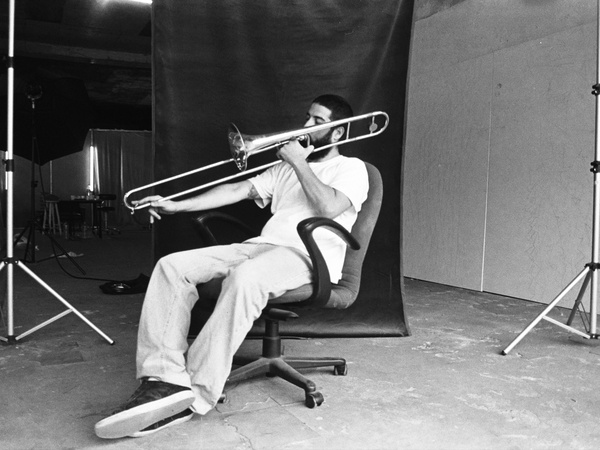Coming from a musical family, Antonio's father, Eduardo Neves, was a renowned conductor and a professor at Juilliard School of Music and the California Jazz Conservatory. In the bohemian neighborhood of Lapa, aged 14, Antonio began his career as a drummer, before experimenting with brass. He would soon become a skilled trombonist and arranger achieving the recognition of his teachers and peers. It wasn't long before he would be playing with some of the biggest names in Brazilian music, such as Hamilton de Holanda, Leo Gandelman, Moreno Veloso, Kassin, and Elza Soares. His debut album as a trombonist was PA7 (2017, Rock It), released at the same time he was travelling the world playing with artists like Moreno Veloso, Kassin, and Leo Gandelman, and recording the albums Jobim, Orquestra e Convidados (2017, Biscoito Fino), with Mário Adnet and Paulo Jobim; and Elza Soares Canta e Chora Lupi (2017, Coqueiro Verde Records). More recently, Neves was the arranger for the acclaimed Little Electric Chicken Heart album, by Ana Frango Elétrico, which has been nominated for a Latin Grammy and voted 2019's "Brazilian Music Revelation" by The Art Critics Association of São Paulo.

|
|
|
|
|
|
|
|
|
|
|
|
LP
|
|
FARO 221LP
|
LP version. From samba and bossa nova through to baile funk, with carioca expressions of jazz, rock, and hip-hop in between, the sound of Rio de Janeiro, while continually evolving, has always held an unnamable quality which reflects the magic and mystique of the city itself. Multi-instrumentalist and arranger Antonio Neves is the city's newest trailblazer: the enfant-terrible of Rio's music scene, leading a vital and diverse constellation of both emerging and well-known artists advancing the city's musical legacy. "It all started one sleepless night, after watching a Quincy Jones documentary." Inspired by the legendary music magnate, Neves began writing a list of artists residing in Rio de Janeiro "people that I admire, that I consider geniuses of their instruments, who share with me affinities, anxieties and projects." The list included some of Brazil's most revered living musicians who Neves has worked with in recent years: Hamilton de Holanda, Leo Gandelman, and Dorival Caymmi. Neves also called on some of Brazil's most exciting emerging talents including Alice Cayymii and Ana Frango Eletrico. A Pegada Agora É Essa (The Sway Now) is Neves's second album: a vibrant portrait of the current Brazilian music scene. From the regional to universal, popular to erudite, samba to rap, Latin rhythms to jazz, MPB and pop to good old rock n' roll, Neves walks with fluency and mastery amongst all the musical genres that Brazil has to offer. "My offer to the musicians was complete freedom to express themselves through the songs I proposed -- classics like 'Summertime', 'Luz Negra', and 'Noite de Temporal', and compositions of my own -- creating a space of authorship for the band and the guests. A space for inventions, purges, delusions, laughter. The idea was to bring the freedom of jazz crossed by Brazilian rhythms, such as the traditionals "Partido Alto" ("A Pegada Agora É Essa") and "Jongo" ("Jongo no Feudo" and "Luz Negra"); rhythms of African-Brazilian religions like Candomblé ("Noite de Temporal") and Umbanda ("Forte Apache"); and a tribute to newest Rio de Janeiro's contribution to Brazilian music, the funk Carioca ("Simba"). Features Leda, Esguleba, Alice Caymmi, Ana Frango Elétrico, Hamilton de Holanda, Leo Gandelman, and Edu Neves.
|
|
|
Artist |
Title |
Format |
Label |
Catalog # |
|
|
CD
|
|
FARO 221CD
|
From samba and bossa nova through to baile funk, with carioca expressions of jazz, rock, and hip-hop in between, the sound of Rio de Janeiro, while continually evolving, has always held an unnamable quality which reflects the magic and mystique of the city itself. Multi-instrumentalist and arranger Antonio Neves is the city's newest trailblazer: the enfant-terrible of Rio's music scene, leading a vital and diverse constellation of both emerging and well-known artists advancing the city's musical legacy. "It all started one sleepless night, after watching a Quincy Jones documentary." Inspired by the legendary music magnate, Neves began writing a list of artists residing in Rio de Janeiro "people that I admire, that I consider geniuses of their instruments, who share with me affinities, anxieties and projects." The list included some of Brazil's most revered living musicians who Neves has worked with in recent years: Hamilton de Holanda, Leo Gandelman, and Dorival Caymmi. Neves also called on some of Brazil's most exciting emerging talents including Alice Cayymii and Ana Frango Eletrico. A Pegada Agora É Essa (The Sway Now) is Neves's second album: a vibrant portrait of the current Brazilian music scene. From the regional to universal, popular to erudite, samba to rap, Latin rhythms to jazz, MPB and pop to good old rock n' roll, Neves walks with fluency and mastery amongst all the musical genres that Brazil has to offer. "My offer to the musicians was complete freedom to express themselves through the songs I proposed -- classics like 'Summertime', 'Luz Negra', and 'Noite de Temporal', and compositions of my own -- creating a space of authorship for the band and the guests. A space for inventions, purges, delusions, laughter. The idea was to bring the freedom of jazz crossed by Brazilian rhythms, such as the traditionals "Partido Alto" ("A Pegada Agora É Essa") and "Jongo" ("Jongo no Feudo" and "Luz Negra"); rhythms of African-Brazilian religions like Candomblé ("Noite de Temporal") and Umbanda ("Forte Apache"); and a tribute to newest Rio de Janeiro's contribution to Brazilian music, the funk Carioca ("Simba"). Features Leda, Esguleba, Alice Caymmi, Ana Frango Elétrico, Hamilton de Holanda, Leo Gandelman, and Edu Neves.
|
|
|
|